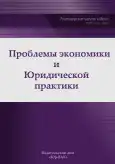Development of a methodology for checking counterparties to implement the principle of due diligence
- Authors: Kashirskaya L.V.1, Zurnadzhyants Y.A.2, Kutsaya S.S.1
-
Affiliations:
- Financial University under the Government of the Russian Federation
- Astrakhan State Medical University
- Issue: Vol 19, No 5 (2023)
- Pages: 224-228
- Section: Regional and Sectoral Economics
- URL: https://journal-vniispk.ru/2541-8025/article/view/252631
- EDN: https://elibrary.ru/VQDBNC
- ID: 252631
Cite item
Abstract
Task. This article is a developed methodology for checking counterparties to implement the principle of due diligence. The article proposes an algorithm for checking the counterparty. In modern conditions, companies are increasingly resorting to checking counterparties. The proposed method of checking counterparties, aimed at improving the level of economic security and key financial indicators, is definitely relevant, since it is an effective tool for ensuring economic security.
Model. The article presents the main elements of the due diligence methodology that contribute to reducing the risks associated with the transaction, through which it becomes possible to avoid potential legal, financial and operational problems.
Conclusions. The methodology discussed in this article focuses on the important components that contribute to minimizing the risks associated with the implementation of transactions. By using these elements, it becomes possible to prevent potential negative consequences from a legal, financial and operational point of view. Consideration and consideration of these factors during the conduct of prudence can improve the quality of decisions and protect against unforeseen risks.
Practical value. The practical significance of the article lies in the fact that the conclusions obtained and the proposed aspects of the counterparty verification methodology for the implementation of the due diligence principle will improve the decision-making process and make it more reasonable and justified in terms of potential risks. If the recommendations of the methodology are followed, it is possible to reduce the likelihood of problems and ensure more efficient execution of transactions with minimal risks and consequences.
Originality. The area of audit under study has not been fully investigated and presented for practical application, but it is due diligence audit that makes it possible to fully assess economic entities: analysis of market position, reputation, financial condition, legal status and other parameters that will help assess the degree of reliability of the counterparty.
Keywords
Full Text
##article.viewOnOriginalSite##About the authors
Liudmila V. Kashirskaya
Financial University under the Government of the Russian Federation
Email: kashirskaya76@mail.ru
ORCID iD: 0000-0002-0234-0223
SPIN-code: 7524-1980
Scopus Author ID: 57210969400
ResearcherId: Q-1289-2017
Dr. Sci. (Econ.), Associate Professor, Professor of the Audit and Corporate Reporting Department
Russian Federation, MoscowYulia A. Zurnadzhyants
Astrakhan State Medical University
Author for correspondence.
Email: julia.zur@yandex.ru
ORCID iD: 0000-0002-7820-9918
SPIN-code: 3015-7800
Cand. Sci. (Econ.), Associate Professor, Associate Professor of Department of economics and health care management with postgraduate course
Russian Federation, AstrakhanSvetlana S. Kutsaya
Financial University under the Government of the Russian Federation
Email: kutsaya999@bk.ru
Master's Student of the Audit and Corporate Reporting Department
Russian Federation, MoscowReferences
- Likhotina Yu.A. Criterion of due diligence in the concept of unjustified tax benefit taking into account changes in tax legislation // Financial law. —2020. —No. 5. —pp. 43–46.
- Solovyova Yu.M. The principle of due diligence and risk management // The economy of the new world. —2022. —№1 (24). —Pp. 58–71.
- Orlova O.E. Due diligence when choosing a counterparty: a practical aspect // VAT: problems and solutions. —2020. —No. 9. —pp. 84–92.
- Khmelev S.A. Problematics of the application of the principle of due diligence in the implementation of tax control in order to ensure the economic security of the enterprise // Russian Journal of Management. —Vol.8. —№ 4. —2021. —Pp. 51–55.
- Pozdnyakova T.S. Analysis of methods of checking counterparties in order to ensure the economic security of JSC «Arnest» // Bulletin of Eurasian Science. —2021. —No.6. —p. 69.
- Shibanova A.A. Ensuring due diligence in the economic activities of economic entities // International Journal of Humanities and Natural Sciences. —2022. —No. 10-4. —pp. 215–217.
Supplementary files









